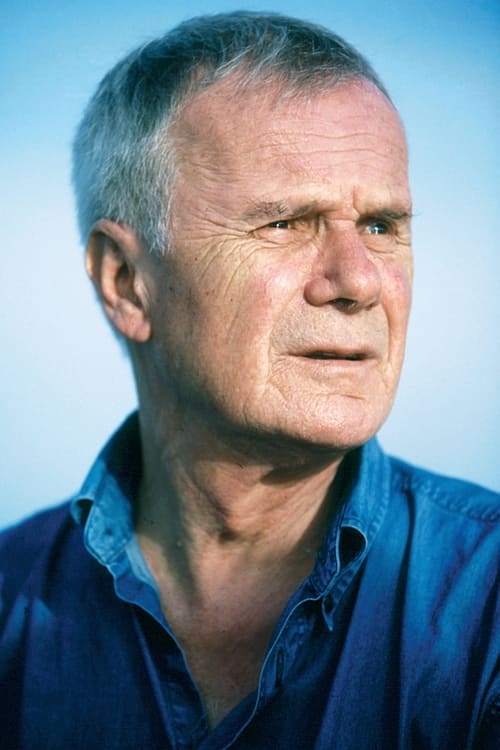
Pierre Schoendoerffer
Birth : 1928-05-05, Chamalières, Puy-de-Dôme, France
Death : 2012-03-14
History
Pierre Schoendoerffer (5 May 1928 – 14 March 2012) was a French film director, a screenwriter, a writer, a war reporter, a war cameraman, a renowned First Indochina War veteran, a cinema academician. He was president of the Académie des Beaux-Arts for 2001 and for 2007.
In 1967, he was the winner of the Academy Award for Best Documentary Feature for The Anderson Platoon. The film followed a platoon of American soldiers for six weeks at the height of fighting in Vietnam during 1966.
Pierre Schoendoerffer was born in Chamalières of a French Alsatian Protestant family. As Alsace was a territory contested and annexed in the 17th, 19th and 20th centuries by both France and Germany leading to the Franco-Prussian War (1870) next World War I (1914–18), his forefathers were French, and lost all their belongings.
His maternal grandfather, who was an 1870 veteran, volunteered in the French Army in 1914 at the age of 66 and the rank of captain. He was killed during the Second Battle of the Aisne at Chemin des Dames. His father was the director of the Annecy hospital and died shortly after the end of the battle of France (1940), where he was injured.
He met his wife Patricia in Morocco (then a Spanish-French joint protectorate), she was a journalist for France-Soir. They had three children, actor and screenwriter Frédéric Schoendoerffer, director and producer Ludovic Schoendoerffer and actress Amélie Schoendoerffer.
Pierre Schoendoerffer died, aged 83, on 14 March 2012 in France.
During World War II, Schoendoerffer lost his father and was not doing well with his studies at school in Annecy. In winter 1942–43, he read Joseph Kessel's epic adventure novel Fortune Carrée (1932), which changed his ambitions; he wanted to become a mariner and travel the world.
In 1946, he spent his summer as a fisherman aboard a small fishing trawler in the Bourgneuf-en-Retz bay, near Pornic, Pays de la Loire (close to Brittany). From this experience he would later direct Than, the Fisherman shot in Vietnam, and Iceland Fisherman.
The following year he went back to the Pays de la Loire region and embarked on a Swedish cargo ship at Boulogne.
In 1947, on board a merchant navy coaster, he sailed for two years in the Baltic Sea and North Sea. This experience would later find echoes in Seven Days at Sea, The Drummer-Crab and even in Above the Clouds.
From 1949 to 1950 he left the sea to fulfill mandatory military service in the Alpine infantry's 13e Bataillon de Chasseurs Alpins ("13th Alpine Hunters Battalion", 13e BCA) based in Chambéry and Modane, Rhône-Alpes. The Alpine infantry would later be the title character's corps in The Honor of a Captain.
Young Schoendoerffer had realized he was not born to be a mariner, but he did not want to be a soldier either, thinking he would be wasting his time. What he wanted to do was filmmaking. As he failed to enter the television and cinema industries, he began photography instead. One day as he read a Le Figaro article about war cameraman Georges Kowal, Killed in action during the First Indochina War, he decided to try his luck in the Service Cinématographique des Armées ("Armies' Cinematographic Service", SCA, now ECPAD). ...
Source: Article "Pierre Schoendoerffer" from Wikipedia in English, licensed under CC-BY-SA 3.0.
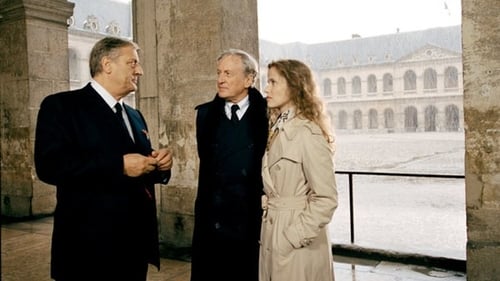
Writer
Henri Lanvern is shooting a film in Thailand. One evening, at the end of the shooting, he sees a friend of the war, General Cao Ba Ky, escaped from a communist re-education camp. No more news from Lanvern since.

Director
Henri Lanvern is shooting a film in Thailand. One evening, at the end of the shooting, he sees a friend of the war, General Cao Ba Ky, escaped from a communist re-education camp. No more news from Lanvern since.
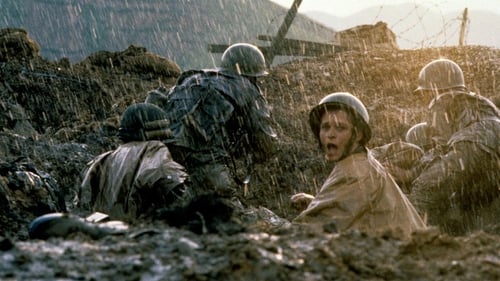
Screenplay
Vietnam, 1954. An American reporter finds himself in the middle of the battle of Điện Biên Phủ, between the French army and the Vietminh.

Producer
Vietnam, 1954. An American reporter finds himself in the middle of the battle of Điện Biên Phủ, between the French army and the Vietminh.

Director
Vietnam, 1954. An American reporter finds himself in the middle of the battle of Điện Biên Phủ, between the French army and the Vietminh.
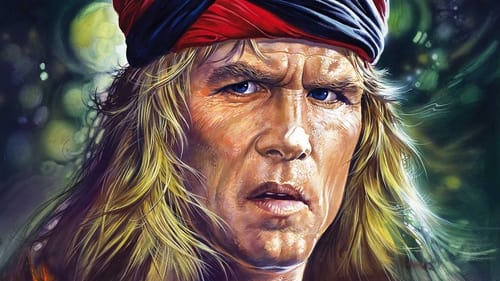
Novel
An American soldier who escapes the execution of his comrades by Japanese soldiers in Borneo during WWII becomes the leader of a personal empire among the headhunters in this war story told in the style of Joseph Conrad and Rudyard Kipling. The American is reluctant to rejoin the fight against the Japanese on the urging of a British commando team but conducts a war of vengeance when the Japanese attack his adopted people.
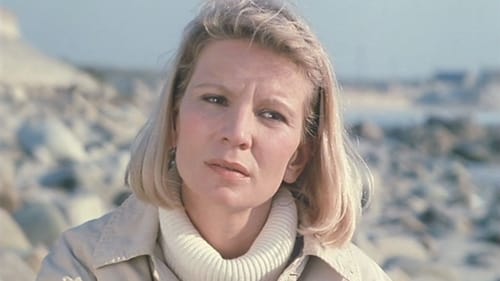
Director
During a televised debate on the Algerian war in the early 1980s, Professor Paulet denounced the methods of Captain Caron, killed in action in 1957. The widow of the captain, Patricia, decided to file a defamation suit.
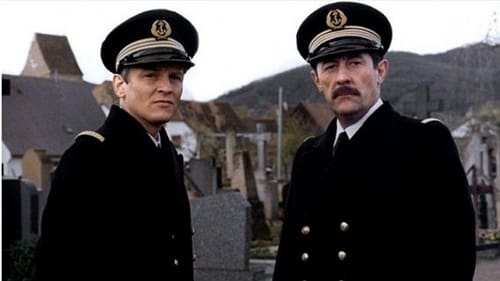
Novel
"Le Crabe Tambour" ("Drummer Crab") is the nickname for the mysterious central character, Willsdorff (Jacques Perrin), an Alsatian, whose doomed, out-of-date career is recalled through the tales of three naval officers currently serving aboard a French supply ship in the North Atlantic.

Screenplay
"Le Crabe Tambour" ("Drummer Crab") is the nickname for the mysterious central character, Willsdorff (Jacques Perrin), an Alsatian, whose doomed, out-of-date career is recalled through the tales of three naval officers currently serving aboard a French supply ship in the North Atlantic.

Director
"Le Crabe Tambour" ("Drummer Crab") is the nickname for the mysterious central character, Willsdorff (Jacques Perrin), an Alsatian, whose doomed, out-of-date career is recalled through the tales of three naval officers currently serving aboard a French supply ship in the North Atlantic.

Producer
A documentary feature by Pierre Schoendoerffer about the Vietnam War.

Writer
A documentary feature by Pierre Schoendoerffer about the Vietnam War.

Director
A documentary feature by Pierre Schoendoerffer about the Vietnam War.
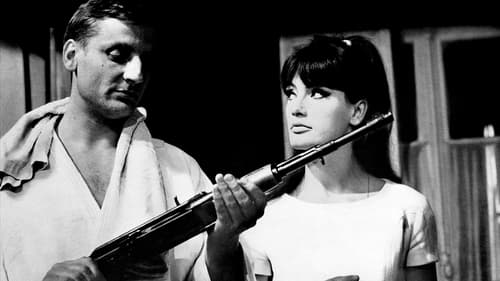
Screenplay
Reichau, a former army captain, is back in France after serving three years in prison for belonging to the OAS (Secret Armed Organization), a dissident paramilitary group during the Algerian War. Marked by his past, he does not believe in the values of his country any more. At a loss to know what to do with his life, he agrees one day to take part in a heist set up by Pierre, a pilot, the very man who gave him away in Oran. The operation, in which Yo, a gorgeous woman, participates, consists in stealing a bag containing 55 million francs during a Paris-Bordeaux flight...

Dialogue
Reichau, a former army captain, is back in France after serving three years in prison for belonging to the OAS (Secret Armed Organization), a dissident paramilitary group during the Algerian War. Marked by his past, he does not believe in the values of his country any more. At a loss to know what to do with his life, he agrees one day to take part in a heist set up by Pierre, a pilot, the very man who gave him away in Oran. The operation, in which Yo, a gorgeous woman, participates, consists in stealing a bag containing 55 million francs during a Paris-Bordeaux flight...

Director
Reichau, a former army captain, is back in France after serving three years in prison for belonging to the OAS (Secret Armed Organization), a dissident paramilitary group during the Algerian War. Marked by his past, he does not believe in the values of his country any more. At a loss to know what to do with his life, he agrees one day to take part in a heist set up by Pierre, a pilot, the very man who gave him away in Oran. The operation, in which Yo, a gorgeous woman, participates, consists in stealing a bag containing 55 million francs during a Paris-Bordeaux flight...
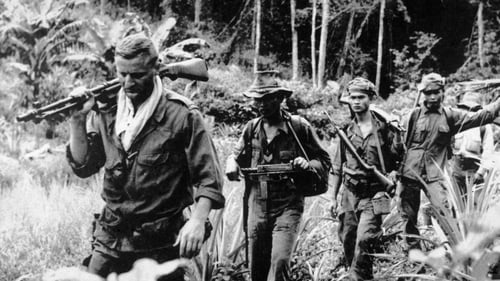
Screenplay
In Laos, 1954, eight days before the french defeat in the Indochina war, the 317th platoon – four french soldiers and 41 laotian combatants – has been ordered to leave its outpost and to retreat for the plains of Diên Biên Phu, where the french army is getting stucked. Led by the inexperienced and idealistic sous-lieutenant Torrens, fresh out of the military academy, and by adjutant Willsdorf, a WWII veteran of the Werhmacht, the group must cross 150 kilometers of jungle. But dripping rainwater, hostile nature, and the Viêt-minh ambushes expose them to constant danger.

Novel
In Laos, 1954, eight days before the french defeat in the Indochina war, the 317th platoon – four french soldiers and 41 laotian combatants – has been ordered to leave its outpost and to retreat for the plains of Diên Biên Phu, where the french army is getting stucked. Led by the inexperienced and idealistic sous-lieutenant Torrens, fresh out of the military academy, and by adjutant Willsdorf, a WWII veteran of the Werhmacht, the group must cross 150 kilometers of jungle. But dripping rainwater, hostile nature, and the Viêt-minh ambushes expose them to constant danger.

Director
In Laos, 1954, eight days before the french defeat in the Indochina war, the 317th platoon – four french soldiers and 41 laotian combatants – has been ordered to leave its outpost and to retreat for the plains of Diên Biên Phu, where the french army is getting stucked. Led by the inexperienced and idealistic sous-lieutenant Torrens, fresh out of the military academy, and by adjutant Willsdorf, a WWII veteran of the Werhmacht, the group must cross 150 kilometers of jungle. But dripping rainwater, hostile nature, and the Viêt-minh ambushes expose them to constant danger.

Director
A french documentary short film directed by Pierre Schoendoerffer.

Director
Rahim's older brother Mokhi refuses to take him to Kabul's big bouzkachi game. Rahim decides to go there on his own. Guided by the angel of death, Azrael, Rahim follows a difficult path to Kabul.

Director
Yan, captain of a fishing boat, falls in love with the daughter of his boss, to the great displeasure of Jenny, his jealous mistress.

Screenplay
Love and adventure story about contraband runners in the Basque province of France.

Director
Love and adventure story about contraband runners in the Basque province of France.









